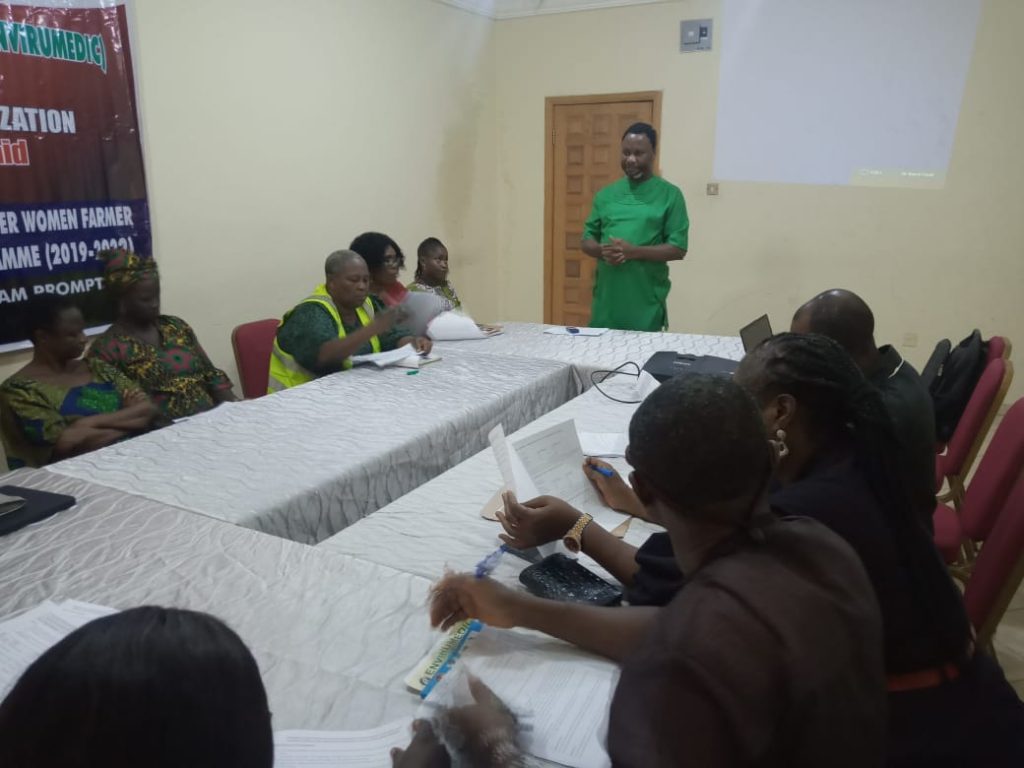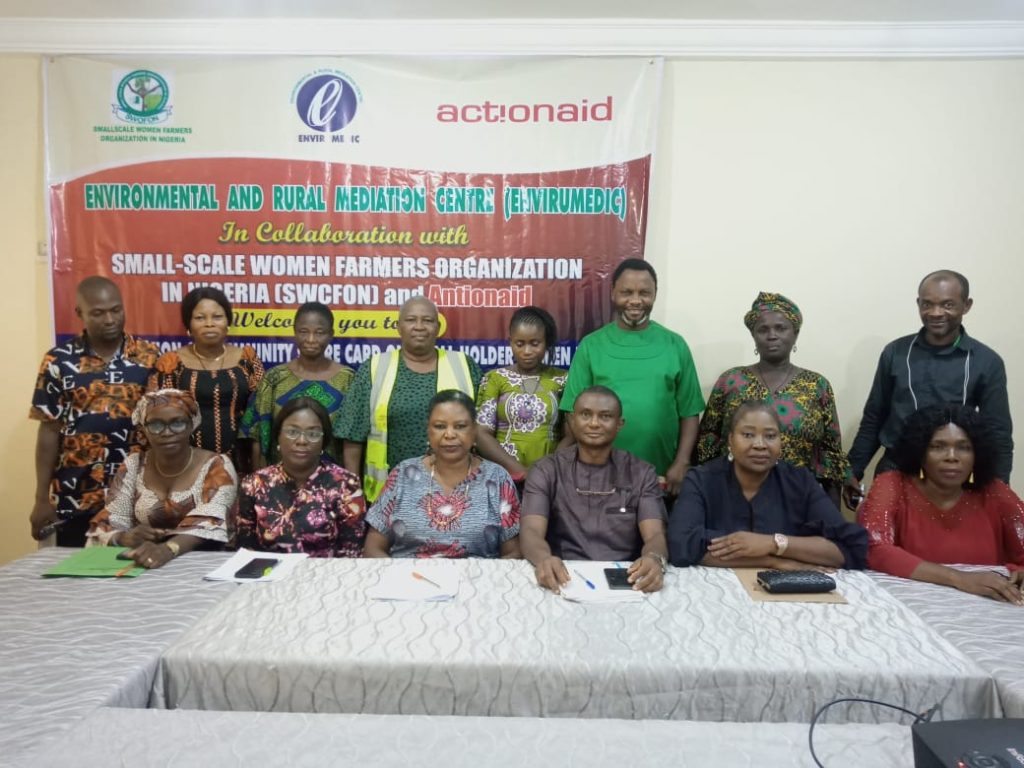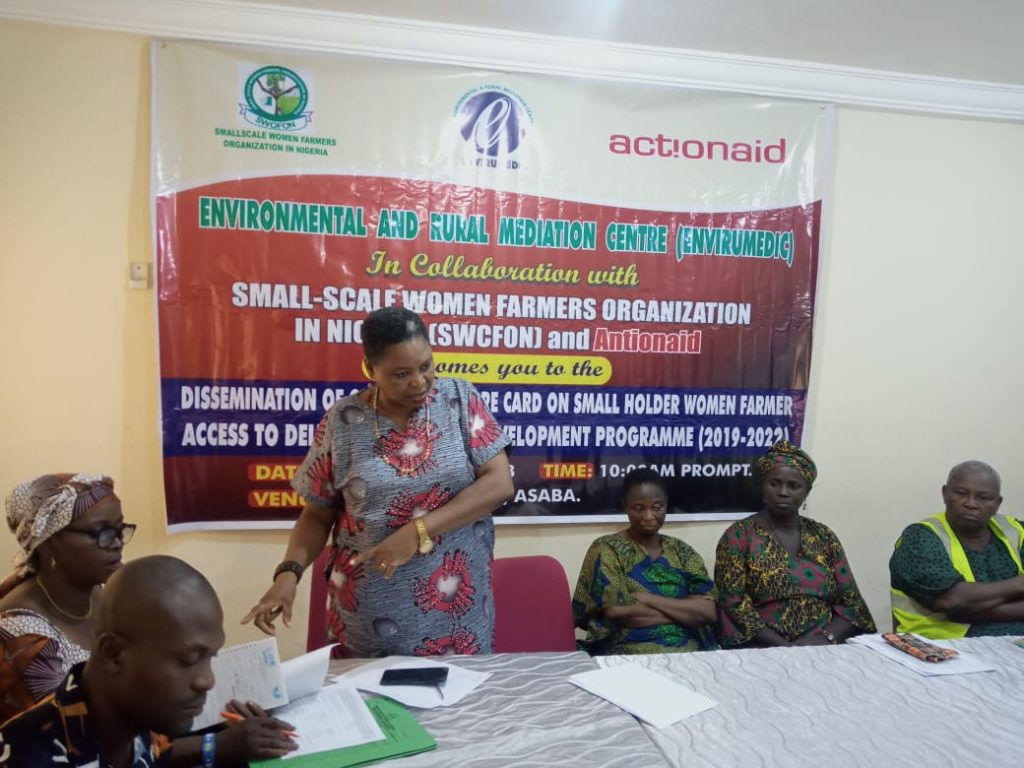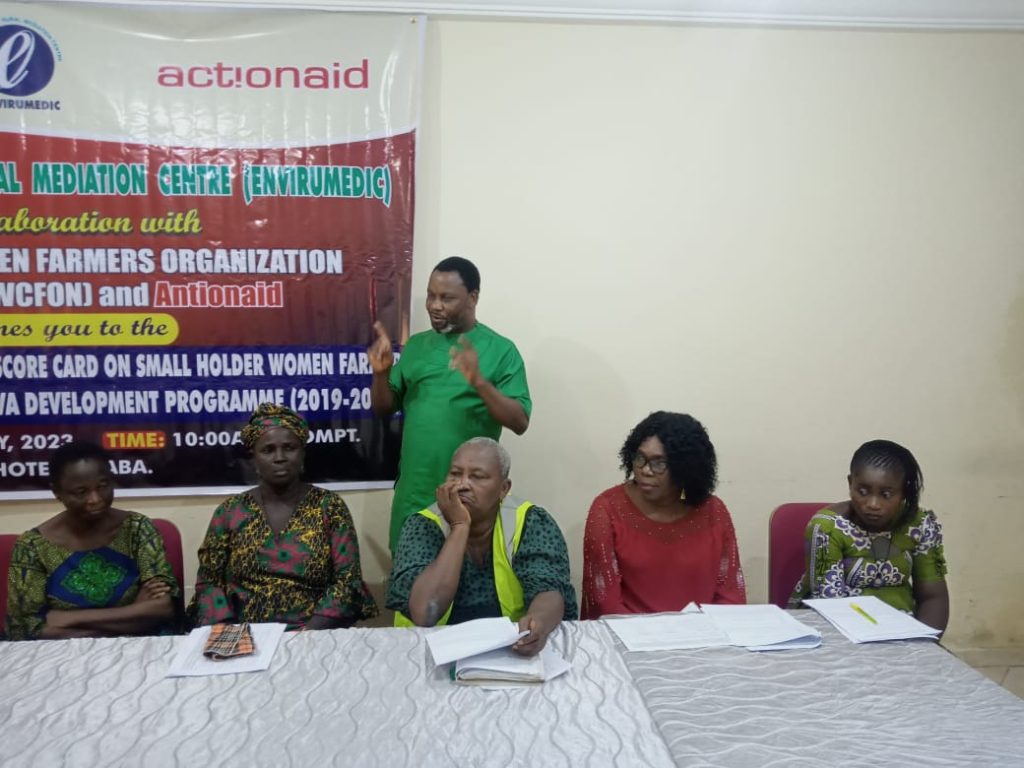……..ENVIRUMEDIC Tasks Delta Agric Ministry on SWOFON Access To Cassava Development Programme.
…..Small-scale women farmer organization in Nigeria (SWOFON) Scorecard unveils gaps in Delta State Cassava Development Programme
.....As ENVIRUNMEDIC, Delta Agric Ministry, SWOFON, and Others Gives Recommendations To Improve Cassava Development Programme’s Access .By Victor Bieni, Asaba
As part of efforts towards identifying challenges backed up with the needed recommendations to ensure improved performance and promote effective access to the Cassava Development Program of the Delta State Ministry of Agriculture and Natural Resources, a Non-governmental organization based in Delta State, Environmental & Rural Mediation Centre (ENVIRUMEDIC) has tasked the officials of Delta Ministry of Agriculture and Natural Resources to ensure that members of Smallholder Women farmers get access to its Cassava Development Program.
The media learned this during a one-day dissemination meeting/press briefing with Agric stakeholders organized by Small-scale Women Farmers Organization in Nigeria (SWOFON) Delta State Chapter, in collaboration with ENVIRUMEDIC with support from ActionAid Nigeria held at Orchid Hotels, Asaba, Delta State. The meeting was anchored by ENVIRUMEDIC officials – Lucky Enegide, Senior Program Officer, Alex Okpekoro, the SUPIA Program officer, and the Delta State SWOFON Coordinator Mrs. Recheal Misan-Ruppee on Wednesday 10th May 2023 as stakeholders identified challenges, proffer recommendations as lasting solutions.
The Senior Program Officer of ENVIRUMEDIC, during an overview of the scorecard presentation, opined that Agriculture remains the mainstay of every National or Economic development of which farmers are the major drivers of food security, and sufficiency in the country producing more than 70% of the food consumed in the state and the Nation at large. He listed some of the gaps identified in the cassava development program as, low level of awareness, low budgetary allocation, low coverage areas, poor data of smallholder women farmers in the State, gaps between the Local Government Agric officers and rural women farmers amongst others were backed up with recommendations by stakeholders.
He posited that the essence of the dissemination meeting was to present the findings of the “Community Score Cards on Smallholder Women Farmer’s access to the Cassava Development Program, identify challenges, and proffer solutions to improve further implementation of the Program. And also, to brief the press on the outcome of the scorecard.
Presenting the findings of the Community Scorecard on the Cassava Development program, the Program Officer of the SUPIA project implemented by ENVIRUMEDIC, stated that the objectives of the assessment include; providing necessary information to women farmers and relevant stakeholders, advocating for improved access and engaging policymakers to ensure Smallholder Women Farmers effective access to Delta State Cassava Development Program and other agriculturally related programs in the State, ensure improved knowledge of stakeholders to government agriculture programs, He added that ENVIRUMEDIC will continue to work in partnership with Delta State Government, SWOFON, and other critical stakeholders to improve food security in the State.
Okekporo noted that data for the scorecard was collected from 228 smallholder women farmers across 12 LGAs out of 25 LGAs of Delta State. The analysis and results; show low access of women farmers to the program, and identified some challenges, and gaps in the Ministry’s interventions as the group made some further recommendations to increase the total number of beneficiaries of the Ministry’s Cassava Development Program. ENVIRUMEDIC used the medium to commend Delta State Government for its various Agric programs, such as supplying Agric inputs to farmers, employing more Agric Extension Agents, and distributing Motor Cycles to Extension Agents in the state, however, demanded more effective services to the rural women farmers.
As the floor was open for interactions among the critical Agric stakeholders, officials of Delta State Ministry of Agriculture and Natural Resources in response to some of the gaps identified by Scorecard Findings, stated that, the data may not have come from the entire farmers across the state, that the Government is ready to attend to farmers. Also, about 50% of farmers in the state have benefited from the Ministry’s Cassava Development program. The Ministry’s officials commended ActionAid and ENVIRUMEDIC on the scorecard dissemination meeting and craved more of this activity to improve the Government’s programs/projects implementation. The agriculture ministry’s staff also commended the State Government’s efforts in deepening extension services, providing funds for extension advisory and related services.
They urged Smallholder women farmers in the state to have cluster farms, relocate their farming to areas with possible larger sizes of land that are tractorable, and identify themselves with the Ministry officials, and Local Government Agric Officers at the LGA. It was noted during the workshop that, the menace of herdsmen, the issue of land fragmentation; land not owned by women but rather owned by families, poor information dissemination, poor awareness creation, poor contacts with real Smallholder Women farmers, and others are major bottlenecks to the assessment of the Cassava Development Program and other Agric programs of the Ministry. As ENVIRUMEDIC, SWOFON, Delta Agric Ministry chats way forward to improved farmers’ access to the Cassava Development Program of the Ministry.
The Delta State Coordinator, Small-scale Women Farmers Organization In Nigeria (SWOFON), Mrs. Rachael Missan-Ruppee presented the recommendations of the scorecard finding to gentlemen of the press during the meeting to all stakeholders as stated: “We, therefore, call on the Delta Ministry of Agriculture to embark on aggressive awareness creation on the cassava development program, smallholder women farmers should be involved in the design and implementation of the program, there should be the timely distribution of inputs to smallholder women farmers, adequate data should be provided for effective planning, there should be the timely release of funds to access agricultural inputs by smallholder women farmers amongst others”.



